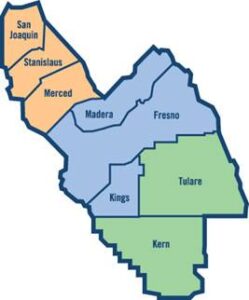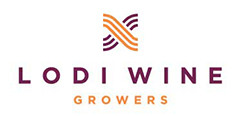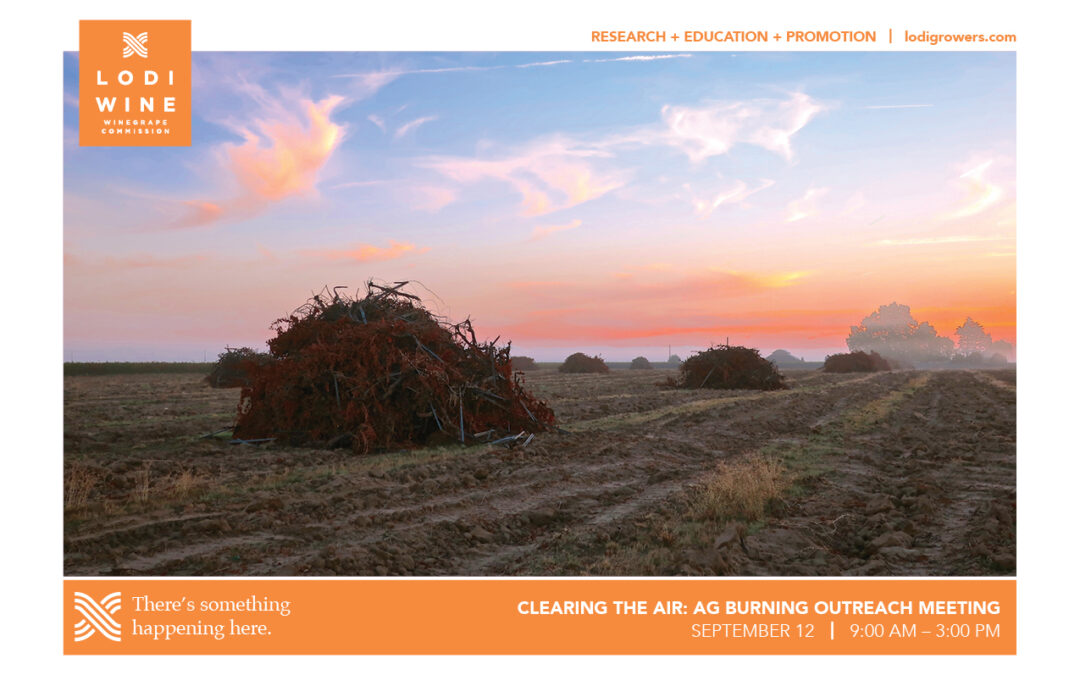AUGUST 21, 2023. BY STEPHANIE BOLTON, PhD, LODI WINEGRAPE COMMISSION.
The Lodi Winegrape Commission has learned through the mealybug and virus crisis that by getting everyone involved in one room to have informed discussions around a complex challenge, much progress can be made and it is easier to move forward in a positive and collaborative manner.

San Joaquin Valley Air Pollution Control District Map, as provided by Jason Lawler, Air Quality Compliance Manager for the Central Region.
One of today’s most pressing complex challenges is increasing restrictions around the legal ability to burn vineyards upon removal, called open-air ag burning. The state of California is now quickly moving towards a near-complete prohibition of open-air agricultural burning in the San Joaquin Valley in an effort to reduce air pollution.
Lodi growers are committed to environmentally responsible farming, as proven by the amount of funding and effort they continue to invest in their world-renowned LODI RULES for Sustainable Winegrowing Certification program, which contains over 70 farming practices that tangibly reduce greenhouse gas emissions. The current ag burning regulations have us a bit perplexed as we think about our environment in a holistic manner, despite our synergistic wishes to enjoy fresh, clean air. By removing pests and diseases such as mealybugs, grapevine viruses, and trunk disease pathogens via burning, which typically occurs only once every 25 to 150+ years for an individual vineyard block, we are preparing the land for a fresh start and reducing our future pesticide use.
Burning has been an efficient, effective and economical way to dispose of diseased plant material for centuries across the globe – rapidly removing harmful pathogens that are a threat to nearby vineyards and to the next crop that goes in the ground. The California Air Resources Board understands this point, and thus there exists an important disease exemption clause which can allow a grower to obtain a burn permit on the recommendation of their local Ag Commissioner’s Office, which I explained in detail at the February 2023 Lodi Grape Day. However, since February, our burn days and amounts allowed (sometimes as small as two acres per day) have become so restrictive that the disease exemption process is too slow to be a viable option for many growers in practice. Having large amounts of bare land with dust blowing in the wind is also not good for air quality, soil health, or grower profitability.
As we’ve attempted to navigate these restrictions and understand our options to safely and effectively dispose of diseased vines, we quickly discovered that there exists an extreme amount of confusion on all sides, from the enforcers not understanding the nuances of the regulation to the growers not knowing how to legally remove a vineyard. To provide much-needed clarity and understanding amongst our winegrowing industry, the Lodi Winegrape Commission has organized a big outreach meeting to gather industry and growers, the California Air Resources Board, the San Joaquin Valley Air Pollution Control District, County Ag Commissioners, and policy makers around the topic of open-air ag burning restrictions and alternatives. We’re calling this meeting, to be held on September 12, 2023 at the Stockton Cabral Ag Center “CLEARING THE AIR” (see details below). If you are considering removing a vineyard anytime in the next ten years or so, you should attend. All are welcome.
As we’ve done in past years with our Mealybug & Virus Outreach Meetings, we’ll have morning presentations, time to interact with people involved (including contractors who provide burning alternatives in San Joaquin County), lunch, and optional afternoon sessions to learn more about curtain burning/grinding, financial incentives, and pyrolysis/biochar.
CLEARING THE AIR: AG BURNING OUTREACH MEETING
Date: Tuesday, September 12, 2023
Time: 9:00am – 3:00pm
Venue: Cabral Ag Center, 2101 E Earhart Ave, Stockton, CA 95206
Cost: FREE, all are welcome
Proposed Agenda:
9 – 11:45am | Morning Presentations
• Open-air ag burning’s effects on air quality – CA Air Resources Board
• Burn day outlook and disease exemptions – SJ Valley Air Pollution Control District
• Explanation of current regulations and how to comply – SJ Valley Air Pollution Control District
• Incentive programs for vendors and growers – SJ Valley Air Pollution Control District
BREAK OUT TIME TO DIGEST INFORMATION AND SHARE THOUGHTS IN GROUPS
• Viticulture-specific challenges, including pest management – Lodi Winegrape Commission
• Open-air ag burning alternatives plus scale, costs, and logistics: curtain burners, grinders/chippers/shredders (and related hazards), trench burners, pyrolysis (biochar) units, international solutions
• Vineyard removal carbon sequestration/biochar opportunities – Monterey Pacific & The Sitos Group
11:45am – 12:15pm | Interaction Time (tables around the room with vendors, organizations, etc.)
12:15 – 1pm | Tri-Tip Lunch
1 – 3pm | Optional Focused Topic Discussions in Classrooms: pyrolysis (biochar), curtain burners/grinding, financial incentives
RSVP by September 7: To the Lodi Winegrape Commission by phone 209.367.4727 or email info@lodiwine.com.
A special thanks to the California Air Resources Board, San Joaquin Valley Air Pollution Control District, San Joaquin Co. Ag Commissioner’s Office, California Association of Winegrape Growers (CAWG), Lodi District Grape Growers Association (LDGGA), Don Wortley, Garrett Fowler, Jamie Renton, Joe Valente and the many Lodi growers who have helped us learn about these regulations and how to best help our growers understand their options for vineyard removal. We’d also like to thank Steve McIntyre and Dr. Doug Beck of Monterey Pacific and Sitos Group for teaching us about the option of pyrolysis burning for the creation of useful biochar. Lunch on September 12 is sponsored by the Lodi Winegrape Commission, CAWG, and LDGGA. The San Joaquin Co. Ag Commissioner’s Office has sponsored the room rental.
I have handed over disease exemption letter writing to Dr. Justin Tanner (UCCE Viticulture Farm Advisor for San Joaquin County) after his hiring this year. Please contact Dr. Tanner if you wish to get a disease exemption letter, although be aware that the process to actually burn if given a permit has considerably slowed down.
Looking forward to seeing you all on September 12!
Have something interesting to say? Consider writing a guest blog article!
To subscribe to the Coffee Shop Blog, send an email to stephanie@lodiwine.com with the subject “blog subscribe.”
To join the Lodi Growers email list, send an email to stephanie@lodiwine.com with the subject “grower email subscribe.”
To receive Lodi Grower news and event promotions by mail, send your contact information to stephanie@lodiwine.com or call 209.367.4727.
For more information on the wines of Lodi, visit the Lodi Winegrape Commission’s consumer website, lodiwine.com.
For more information on the LODI RULES Sustainable Winegrowing Program, visit lodigrowers.com/standards or lodirules.org.


